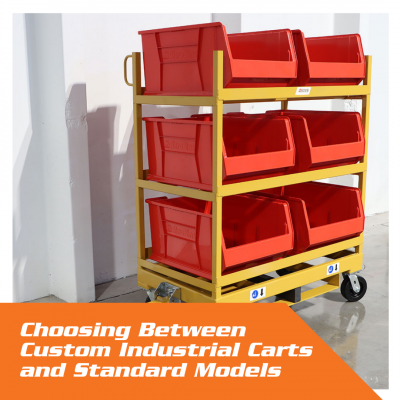We use cookies to make your experience better. To comply with the new e-Privacy directive, we need to ask for your consent to set the cookies. Learn more.
Choosing Between Custom Industrial Carts and Standard Models

Not necessarily. BHS, Inc. is a U.S.-based manufacturer that offers custom options on all of our products. The process starts with a conversation — you can even chat with us online — and BHS will produce heavy duty industrial carts to match your exact specifications. Because this is our regular workflow, we can meet demanding timelines and unique requirements.
So how do you know when you need a custom cart? Here are a few things to consider when making the decision between a custom industrial cart and the standard models:
- Size and capacity of your typical load. Some products are big, unwieldy, heavy, or just oddly shaped. If you manufacture, store, or distribute items that meet these descriptions, you may need to go with a custom-built fleet of carts.
For example, BHS once filled a custom cart order for a major furniture distributor. Each distribution center in this company’s network focused on just a handful of products — DC A might only stock sofas and beds, for instance, while DC B handles tables and chairs. In this case, the company needed several different cart designs, each designed to support the specific shape and weight of that distribution center’s commonly handled items.
- Product organization during handling. Items don’t just need to be organized on warehouse shelves. In some picking applications, carts themselves must be configured to keep orders separate, or to accommodate multiple items of multiple types. A custom industrial cart with integrated compartments or shelves can increase efficiency in applications like these.
Take the example of a poster distributor BHS once worked with. Each of these posters is stored rolled into a tube, and the same image may appear in multiple sizes. Order pickers had to keep their items organized by size and graphic on their carts, which required a custom build with deliberately sized compartments for each type of poster.
- Regulated material requirements. The Food and Drug Administration (FDA) Food Code requires food-contact surfaces to be smooth, easy to clean, and durable. In the food manufacturing industry, that typically means stainless steel. Because carts in this application often carry ingredients and finished food products, they may need stainless steel construction — often a custom alteration to existing service cart designs.
Stainless steel is also popular in medical applications, and any number of materials may be specified for niche manufacturing operations — and that may require ordering a custom industrial cart.
- Security requirements. Standard heavy duty industrial carts don’t typically include locked drawers or gated shelves. Thanks to BHS’ custom engineering and design services, these security features can be added to carts to create an ideal solution for security-conscious applications.
The medical industry is one example. Service carts in the medical and pharmaceutical fields may have to carry heavy equipment while also securing medication with locking compartments. This is a common request on custom shelf carts, and BHS can provide security features to match your specifications.
- Branding considerations. Some end-users prefer material handling equipment that matches the brand’s color scheme, or that includes a prominent logo. At BHS, we laser-cut logos on lots of equipment. The location will differ from model to model, but our CNC-controlled laser cutters ensure accuracy to your image file and a great-looking final product.
Custom industrial carts are typically finished with a scratch-proof powder coating that’s available to match branding colors. Representing the end-user’s brand is a standard service with BHS industrial carts, but, technically, it is a custom-ordered alteration.
The above examples are not comprehensive — there are countless reasons to choose a custom industrial cart over a mass-manufactured competitor. We’ll leave you with one more example. This one illustrates the challenge of handling heavy duty products that also must sit on carts in a particular way (something that’s not always possible on a stock material handling cart).
Custom Industrial Carts from BHS, Inc. for Manufacturing Equipment
One BHS customer distributed dies, the heavy steel molds used in die casting manufacturing processes. These dies looked similar from the outside, and identifiers on the type of die were printed only on one side of the exterior of each unit. That led to a problem with standard carts: When workers stacked the dies, they obscured the labels, making it impossible to determine which die was which.
The solution was a fleet of custom industrial carts that were built to carry dies vertically, not stacked on their sides. This allowed users to place the label-side out on every cart. Note that dies are notoriously heavy; these carts would also have to include heavy duty casters and high load capacities.
BHS designed the carts, ran the drawings by the dealer and end-user, and ended up shipping an order of custom industrial carts that solved the client’s material handling challenge for good. If your facility faces a similar challenge, call the BHS sales team at 1.800.BHS.9500. Learn more about custom material handling equipment from BHS here, and browse the collection of standard BHS material carts here — and remember that these products can be customized to match any application.
